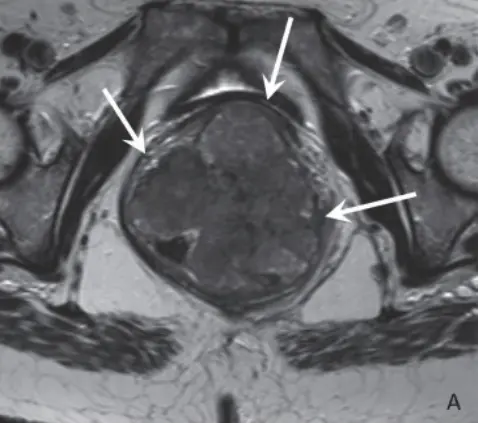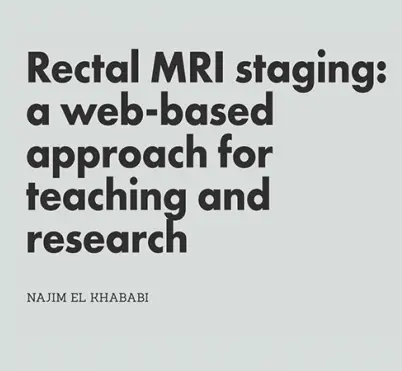- März 19, 2024
A WEB-BASED APPROACH FOR TEACHING AND RESEARCH


Dr. Ferdinand Bauer is co-author of the book
Abstract
Objectives:
With this thesis we developed a practical web-based tool (iScore) and research infrastructure to investigate and validate visual diagnostic methods and staging templates on a large scale within the clinical context of rectal cancer..
Main aims and outcomes:
MRI plays a crucial role in the local staging of rectal cancer and is the main tool used to stratify patients into different risk groups used to guide treatment planning. MRI nowadays also has an important role (next to endoscopy) to evaluate the local tumour response in patients undergoing neoadjuvant (chemo)radiotherapy (CRT) and to help identify which patients may be candidates for organ-preserving treatment alternatives. To support radiologists, several image guidelines, reporting guides and staging templates are available, as well as more recently developed grading systems to aid in assessing the local tumour response after CRT. An important goal of these tools is to enhance uniformity in radiological reporting and thereby promote consistent and evidence-based patient management. However, there are several potential pitfalls. Limited data is available on the reproducibility of different grading systems and on whether they are accurate in the hands of radiologists in everyday clinical practice. An important reason for this is that it is logistically challenging and costly to set up studies to test and validate diagnostic methods on a large scale, i.e. with multiple radiologists and using data from different clinical centres. An user-friendly platform to enable large scale diagnostic validation studies where images from different clinical centres can easily be shared and evaluated by multiple readers has so far been lacking. With this thesis, we successfully developed a practical web-based tool (iScore) to enable large scale testing and validation of visual diagnostic classification and staging methods while at the same offering online feedback, training and teaching to a large platform of radiologists. Seventy-four radiologists from over fifteen different countries participated in the projects described in this thesis. The pearls and pitfalls in staging and response evaluation that were identified can help to further optimize radiological staging guides, promote effective further clinical implementation, and ultimately improve diagnostic staging and reporting quality. In Chapter 2 we found that several staging items included in structured reporting templates lacked sufficient reproducibility. Main risk variables such as T- and N- stage showed considerably better reproducibility in a dichotomized risk stratification. In Chapter 4 we have shown that such a dichotomized staging can have a significant impact on the stratification of patients into low versus high-risk subgroups thereby affecting treatment planning.
In Chapter 2 we also found a significant positive correlation between diagnostic confidence and diagnostic staging accuracy, suggesting that a confidence level should perhaps be included in reporting templates, especially for variables with low reproducibility. Regarding the assessment of response of rectal tumours to chemoradiation, we identified in Chapter 5 as an important pitfall that MRI is not accurate for yT staging in patients who respond very well and show predominant fibrosis after CRT. In these patients yT-stage accuracy on MRI is less than 50% and results in major overstaging. Diese Ergebnisse deuten darauf hin, dass in dieser Untergruppe das yT-Staging vielleicht ganz aufgegeben werden sollte und wir nach alternativen Wegen suchen müssen, um die lokale Tumorantwort zu beurteilen. In Kapitel 6 stellten wir fest, dass Methoden zur Bewertung des Ansprechens, die die Ergebnisse der diffusionsgewichteten Bildgebung (DWI) berücksichtigen, die günstigsten Ergebnisse zeigten. Additionally, we found that experience level of the radiologists performing the assessments, as well as image quality both had a significant impact on the performance on these restaging methods, stressing the importance of high-quality image acquisition and dedicated radiologist training. In Chapter 7 we found encouraging results for visual assessment of MRI to predict response already at baseline, i.e. before the start of treatment. However, the predictive performance of MRI was not sufficient (yet) to guide clinical decision making and should probably be combined with other clinical, histopathological, immunohistochemical and genetic predictors of response.
Finally, in Chapter 3 we showed that our iScore webplatform also offers unique opportunities as a support tool for virtual training and teaching. Exploratory results of a virtual hands-on training program combining individual case-based training with webinars and online expert-teaching showed an overall increase in diagnostic staging performance with corresponding improved interreader reproducibility and staging confidence. These results suggest that dedicated virtual training programs can be a good alternative or addition to face to face training.
Published as:
el Khababi, N. (2024). Rectal MRI staging: a web-based approach for teaching and research. [Doctoral Thesis, Maastricht University].
© 2023 N. El Khababi
ISBN: 978-94-6473-350-1
The full-length publication in English can be found at the following link:
English version: ”Rectal MRI staging: a web-based approach for teaching and research”